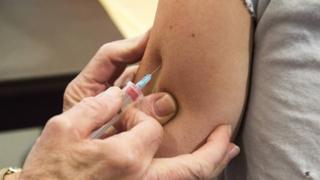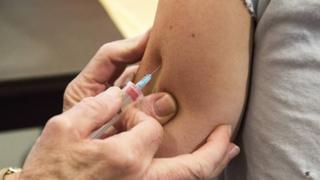Measles, mumps and rubella: How do we eliminate them?
A future free of the three diseases is “within reach” despite recent outbreaks, a health boss says. …

 Image copyright Getty Images
Image copyright Getty Images By the age of five, 92.2% of children in Wales are protected against measles, mumps and rubella.
This puts it above the other UK nations – with 86.4% having had the full dose of the vaccine in England, 91.3% in Scotland and 91.4% in Northern Ireland.
However, Public Health Wales (PHW) said it was still “suboptimal” for preventing further outbreaks of measles.
It is below the World Health Organization’s target of 95% to protect a population from a disease.
But despite recent outbreaks, a health boss said a push now put eradicating the illnesses within reach if there was a 95% uptake and teenagers and young adults who missed out on vaccination were targeted.
- Suspected mumps among south Wales university students
- Prestatyn school pupil among north Wales measles ‘cluster’
What is MMR?
The MMR vaccination protects against three infections – measles, mumps and rubella (also known as German measles).
Mumps is a contagious viral infection which causes a headache, joint pain and high temperature, and measles gives cold-like symptoms, a temperature and sore red eyes.
Rubella creates a fever and red rash.
The UK lost its measles-free status earlier this year, with cases of the potentially deadly infection going up because not enough people, of all ages, have been vaccinated.
It is one of the world’s most contagious diseases, a viral illness spread by coughing and sneezing.
Although most people who catch it will recover, it can lead to life-threatening complications.
Why are unvaccinated students at risk?
There have been increasing outbreaks of mumps, including in universities because people “gather in close proximity for fairly large periods of time”, according to Prof Jonathan Ball, from the University of Nottingham.
Cardiff University, Cardiff Metropolitan University and the University of South Wales have advised students to be aware of symptoms after an outbreak in Wales.
PHW has urged people to make sure they have received their vaccination.
When do you usually have the MMR jabs?
Generally, the first dose of the MMR vaccine is given to children aged between nine and 15 months, with the second dose any time up until the age of six.
The jabs have helped greatly reduce the numbers of children suffering from the wide-ranging symptoms.
How long does the MMR vaccine protect you for?
The length of protection against the illnesses is described as “very long-lasting” by the NHS, with two doses protecting 99% against measles and rubella.
It is slightly less effective for mumps, which protects 90% to 95% of people, with its effectiveness declining over the years.
How do we eliminate it?
PHW said more youngsters need to receive injections to prevent further outbreaks, as well as adults who missed theirs when they were young.
“MMR vaccination remains the best form of protection against both measles and mumps infection,” a report by PHW said.
“The suboptimal MMR uptake in children is of concern and should be actively addressed to prevent further outbreaks and maintain elimination of measles in the longer term.”
In England, a mandatory vaccination is being looked at, but the Welsh Government said it was not something under consideration.
“In Wales, uptake of the first dose of MMR vaccine in two-year-old children has remained relatively stable at around 95%,” a spokesman said.
“Vaccination is the most effective means of protection and we would urge people to ensure they and their dependants are fully vaccinated from preventable diseases.”
Head of immunisation at Public Health England Dr Mary Ramsay said “action needs to be taken now” to eliminate the illnesses.
“A future free of measles and rubella is within reach if we continue to focus our efforts on reaching 95% uptake with two doses of MMR for all children and catch up teenagers and young adults who missed out,” she added.
This piece has been inspired by questions from BBC Wales News readers.
Is there anything you’ve always wanted to know?
Use this form to send us your questions:
If you are reading this page on the BBC News app, you will need to visit the mobile version of the BBC website to submit your question on this topic.
We may get in touch if we decide to follow up on your suggestion.

